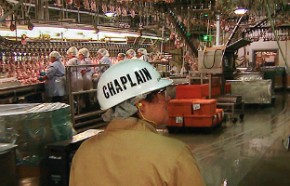A chaplain’s place
The documentary Chaplains raises a fundamental issue for Christian chaplaincy: what is its relationship to the church?

In the documentary film Chaplains, Buddhist chaplain Karuna Thompson offers an unusual—to me—theological foundation for the compassion she shows to the men she works for at an Oregon prison. All of us have countless past lives, she says, and in one or more of them we could have been prisoners. We could also be imprisoned in a future life. This recognition sparks compassion.
That belief is more compelling than her repeated insistence that people are essentially good. The men interviewed have murdered and robbed and don’t seem ready to speak of themselves as trusting their inherent goodness.
Yet I found myself moved by Thompson’s work, as when she helps a Wiccan-observant former U.S. Army soldier trying to prepare for life outside of prison after nearly a quarter century. Will he reoffend? The state of Oregon is paying Thompson’s salary in hopes that he will not. The investment may be paying off—the film reports that Oregon’s recidivism rate is only 23 percent, compared to a national average of 43 percent.





